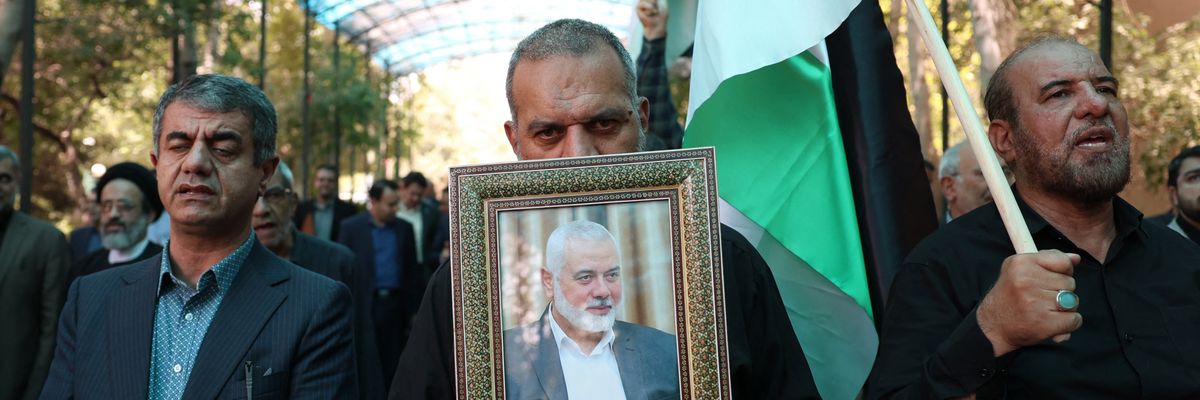The political leader of Hamas was assassinated early Wednesday in what the group said was an Israeli attack on his residence in the Iranian capital of Tehran, which he was visiting to attend the inauguration of the country's newly elected president.
The killing of Ismail Haniyeh, who became the head of Hamas' political arm in 2017, sparked warnings that Israeli Prime Minister Benjamin Netanyahu is doing all he can to undermine cease-fire talks with the Palestinian group after they showed signs of progress in recent weeks.
"Netanyahu has systematically sabotaged cease-fire talks because ending the war will likely end his political career," Trita Parsi, executive vice president of the Quincy Institute for Responsible Statecraft, said following the assassination of Haniyeh, a key figure in the negotiations.
"The assassination buys Netanyahu several weeks, if not months, in which there will be no serious expectation of a cease-fire deal," Parsi argued. "Thus, the war will continue, as will Netanyahu's reign as prime minister."
Haniyeh's killing prompted fury from Iran, whose supreme leader vowed a "harsh response"—heightening the chances of a long-feared all-out war between Israel and Iran. Earlier this year, Israel killed several Iranian commanders in a strike on Tehran's consulate in Syria's capital, prompting Iran to retaliate with a drone attack.
Iranian lawmakers are expected to hold an emergency meeting about Haniyeh's assassination later Wednesday. As of this writing, the Israel Defense Forces (IDF) has yet to comment on the killing.
The International Criminal Court's (ICC) top prosecutor, Karim Khan, was seeking an arrest warrant against Haniyeh for war crimes committed on October 7. Khan has also applied for an arrest warrant against Netanyahu and Israeli Defense Minister Yoav Gallant.
"How can mediation succeed when one party assassinates the negotiator on the other side?"
The suspected Israeli strike in Tehran on Wednesday was launched just hours after Israel's military bombed the Lebanese capital of Beirut, killing several people—including two children—in retaliation for a deadly attack on the occupied Golan Heights. Israel claimed its attack on Beirut killed Hezbollah commander Fouad Shukur, but subsequent reporting suggested he may have survived the strike.
News of Haniyeh's assassination in Tehran came days after top officials from Israel, Egypt, Qatar, and the United States met in Rome over the weekend to continue negotiating a possible deal to end Israel's assault on the Gaza Strip.
The New York Times reported that "despite progress in recent weeks, the monthslong negotiations remain stalled over several critical issues, particularly the extent to which Israeli forces would remain in Gaza during a truce."
"Earlier in July, Israel hardened its position on maintaining checkpoints along a strategic highway south of Gaza City, weeks after suggesting that it could compromise," the Times added. "It was unclear on Sunday if Mr. Netanyahu had allowed negotiators to show greater flexibility on the matter during the talks. Mr. Netanyahu faces pressure from members of his right-wing government to stick to a tougher line. The length of the truce is also a source of dispute: Hamas wants a permanent truce, while Israel wants the option to resume fighting."
Egypt said Haniyeh's killing is a signal from Israel that it lacks "political will for deescalation," according to Al Jazeera.
Qatar's prime minister, meanwhile, wrote on social media: "Political assassinations and continued targeting of civilians in Gaza while talks continue leads us to ask, how can mediation succeed when one party assassinates the negotiator on the other side?"
Jamal Abdi, president of the National Iranian American Council, warned that with the assassination of Haniyeh, "Netanyahu isn't playing chicken, he wants to crash the car."
U.S. Secretary of State Antony Blinken said Wednesday that the United States was "not aware of or involved in" the assassination of Haniyeh.
Belén Fernández, a contributing editor at Jacobin, wrote in an op-ed for Al Jazeera that "Israel made its intention to continue and expand the war clear" by killing Haniyeh.
"By assassinating Haniyeh in Tehran, Israel is literally playing with fire," Fernández wrote. "In order to derail cease-fire prospects and keep up the killing in Gaza, then, it seems Israel is going to end up with a whole lot more regional blood on its hands."
This story has been updated to include new comment from U.S. Secretary of State Antony Blinken.




